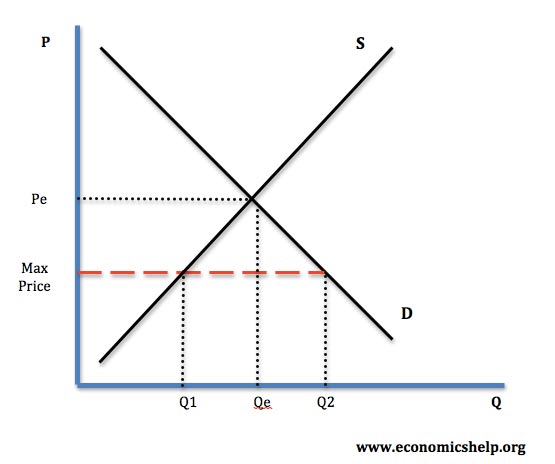For many goods we expect the price to be determined by market forces – by supply and demand. For example, computers, cars, holidays, food e.t.c.
However, there is another class of good where society dislikes the idea of prices being set by market forces. The best example is football tickets or Concert tickets.
.
![]() In a typical business, we would expect the firm to set a price of £77. At £77, the club is maximising its revenue. It just sells out its ground and would make £4.2 million per game.
In a typical business, we would expect the firm to set a price of £77. At £77, the club is maximising its revenue. It just sells out its ground and would make £4.2 million per game.
A few years ago, Manchester United (and other clubs) had a long waiting list for a season ticket. Demand was greater than the supply. Market-based pricing would have pushed up the price of a season ticket until there was no waiting list. Clubs would have made more profit.
But, clubs were already criticised for ‘ripping off’ ordinary fans. Football clubs were nervous of being labelled as elitist and losing long term support.
With concerts, there is an interesting article here about ticket prices in the O2 arena. Ticketmaster is using a system known as ‘market-based pricing.’ A system where prices change to reflect the popularity of the concert. If the equilibrium price is £200, then that is what customers will be charged.
One argument for charging such a high price is that it deters the black market and ticket touts.
If you set a price below the equilibrium, it means a shortage. Some people who miss out on a ticket may be willing to pay highly inflated prices to get a ticket. Thus maximum prices can benefit those who work on the black market the most.

I also notice market based pricing used in airline sales. Ticket prices for Ryanair are always fluctuating. If many tickets are suddenly sold, prices will increase as that flight is indicating near capacity. These higher prices encourage people to go on other flights which are cheaper. This market based pricing is a way of making sure planes get filled with maximum revenue for company.
Related

Sometime last year I read that one airline adjusts it’s online prices based on the number of online price enquiries it receives. The pricing is sensitive to both tickets sold and imminent bookings.
This wouldn’t surprise me because I know that several logistics companies electronically review their re-order levels based on ‘page visits’ of certain items, rather than the actual quantity sold. They presumably have a formula to convert actual enquiries to expected sales.
it is a simple and easy to understand